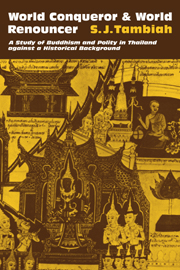 World Conqueror and World Renouncer
World Conqueror and World Renouncer Book contents
- Frontmatter
- Contents
- Acknowledgments
- PART ONE
- PART TWO
- 13 The Composition and Distribution of Religious Personnel: What the Figures Say
- 14 Monkhood as an Avenue of Social Mobility
- 15 Monastic Careers and Monastic Network
- 16 Patronage of the Sangha and the Legitimation of the Polity
- 17 Reformism and Ideological Transformation Based on Tradition
- 18 Missionary Monks (Thammathud) and National Development
- 19 The Politics of National Development and the Symbols of Legitimacy
- 20 Dialectical Tensions, Continuities, Transformations, and the Uses of the Past
- Bibliography
- Index
20 - Dialectical Tensions, Continuities, Transformations, and the Uses of the Past
Published online by Cambridge University Press: 10 November 2010
- Frontmatter
- Contents
- Acknowledgments
- PART ONE
- PART TWO
- 13 The Composition and Distribution of Religious Personnel: What the Figures Say
- 14 Monkhood as an Avenue of Social Mobility
- 15 Monastic Careers and Monastic Network
- 16 Patronage of the Sangha and the Legitimation of the Polity
- 17 Reformism and Ideological Transformation Based on Tradition
- 18 Missionary Monks (Thammathud) and National Development
- 19 The Politics of National Development and the Symbols of Legitimacy
- 20 Dialectical Tensions, Continuities, Transformations, and the Uses of the Past
- Bibliography
- Index
Summary
The stream of events we have documented has occurred in time and space as process; yet we have charted our course with the compass of an overarching ideological conception relating religion and polity in Buddhist Southeast Asia, particularly Thailand. Our approach has consistently averted two theoretical and analytical perspectives that insofar as they are applied to these Southeast Asian Buddhist polities are inaccurate.
We reject that kind of developmental thesis that, beginning with the purely “religious” doctrines of a charismatic leader as the founder of a sect of salvation seekers, sees a subsequent evolution into a “world religion” via the historical intervention of the Asokan reign, during which Buddhism is alleged to have made a political association with kingship, enabling the latter to achieve political centralization while itself making an accommodation to the world. In the same vein certain present-day religious manifestations are, unaided by historical demonstrations, considered “deviations” purely by recourse to their measurement against the pristine canonical ideas. We have in contrast attempted to strengthen the view that early Buddhism was not merely a salvation quest for the virtuosi but also had a developed view of the world process, of kingship as the ordinating principle of the polity cum society, and that the integral yoking of religion and polity, of sangha and kingship, was the armature with which we must begin our investigation. Asoka's illustrious reign then is seen as a realization of this world image and a charter for all succeeding Theravada kingdoms, which developed their own variants of this heritage.
- Type
- Chapter
- Information
- World Conqueror and World RenouncerA Study of Buddhism and Polity in Thailand against a Historical Background, pp. 515 - 530Publisher: Cambridge University PressPrint publication year: 1976
- 1
- Cited by


